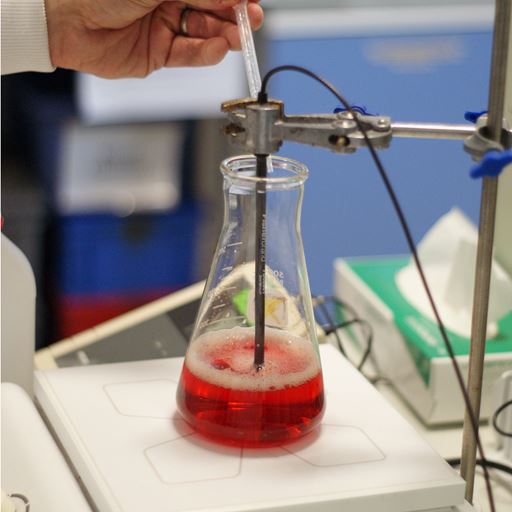Blood substitute research enters exciting new phase
-
Date
Fri 15 Jan 21

Research into developing a blood substitute at the University of Essex has moved into an exciting new phase after securing a major grant for focused trials into their product.
Every day, thousands of people around the world have their lives saved or improved thanks to someone giving blood. However, using donated blood is not without its problems, such as its short shelf life, the risk of contamination, the need to match blood types and increasing difficulties with supply.
For this reason, the quest to create an artificial blood substitute is big business. It is estimated the artificial blood market could be worth more than $15 billion by 2027 but to date many major US companies have fallen by the wayside in the hunt for a substitute.
Many artificial blood substitutes are based on haemoglobin, the key protein in red blood cells that carries oxygen around our bodies. However, these products typically fail during pre-clinical trials due to toxicity issues when haemoglobin is outside the protective environment of the red cell.
HaemO2 is a biotechnology project based at the University’s School of Life Sciences. The beauty of this research at Essex is the scientists have used genetic engineering to decrease the toxicity of haemoglobin in an artificial haemoglobin-based oxygen carrier (HBOC). They have also developed new methods to stabilise the protein outside of the red blood cell.
The £960,000 grant from the Medical Research Council Biomedical Catalyst: Developmental Pathway Funding Scheme will involve scientists at Essex working with colleagues at University College London. The project will work with the Centre for Process Innovation, as a process-manufacturing partner, to take the next step towards bridging the gap between the lab-based research and commercialisation of the product.
Dr Brandon Reeder, who is leading the research and working with Dr Michelle Simons, said: “This is an exciting and important next stage for our research as the award over the next two years will develop methods to produce the product at scale and at clinical grade.
“We will also use focused pre-clinical studies to provide evidence that our product has indeed solved the issues of previous attempts to produce artificial blood substitutes.
“The use of our product to replace donated blood is still some way off. However, we initially intend to use the product like a drug – as an ‘oxygen therapeutic’. Such therapies are designed to be oxygen bridges – taking oxygen to the tissues even though the circulation is failing, protecting or maintaining vital organs.
“For example, our product could be used to treat sickle cell disease, sepsis and stroke. Also our product can be used to keep organs functioning and healthy during the transplantation from a donor to recipient. There is also evidence that such products could oxygenate solid cancers, making them more susceptible to chemotherapy and radiotherapy treatments.”
To date, the University has a blood substitute patent granted in the USA, the EU Australia, India, and Brazil and further patent applications filed in the USA, EU, UK, and South Africa.
If the product can be scaled up to a commercial level and is successful in the focused trials, the next stage is to secure funding so they can validate the technology and product through full pre-clinical trials and early phase clinical trials.
.jpg?mh=500&mw=500&hash=6568B6C9CCF5290A596BEF6678B6AD0E)



